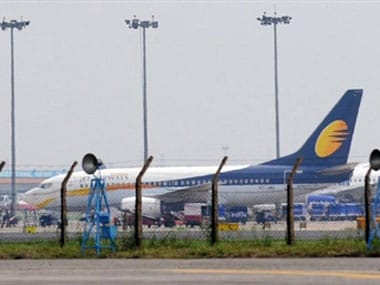It was a very dominant Jet Airways that had approached the market to raise money the last time around. India’s air traffic was growing at double digits, even as (the more mature) global average was only a fourth of this. When the IPO opened in 2005, Jet ruled the domestic market with a 45 percent share. Naresh Goyal’s dream of building a world-class airline second to none, was taking shape. The confidence was evident in the very bullish pricing of the shares at Rs 1,100. Goyal successfully sold 20 percent of the airline at the time, catapulting him to riches and fame. He moved to London and embarked on an aggressive plan to globalise Jet’s operations. The Guardian described his stucco-fronted home in London, as the kind of house that “makes you stop and gawk in wonder about who lives there”. [caption id=“attachment_819107” align=“alignright” width=“380”]  It was a very dominant Jet Airways that had approached the market to raise money the last time around. Reuters[/caption] Jet investors sadly did not have similar luck. The share price never saw the same price again. It tanked over the years and so did Jet’s fortunes. Investors have been critical of Goyal, for the aggressive pricing that left little upside for them. Over the years, first Kingfisher and then the low cost carriers ate into Jet’s dominance of the market. The airline has just announced a loss (before tax) of Rs 485 crore for 2013-14. Its net worth was wiped off long ago and it is rapidly losing the struggle to keep costs in check. Goyal is preparing to hit the market once more this week—this time with an offer for sale (OFS) to divest 5 percent stake. The company hopes to raise around Rs 250 crore through the sale. The market was hoping for an open offer, which did not come through. The dilution is to conform to Sebi’s minimum float norm that has to be met by June 30. The regulator has mandated minimum public shareholding for private companies at 25 percent and for public sector undertakings at 10 percent. Public sector companies have until August 9 to comply with the ruling. Jet had tried to get an exemption from the norm, on the grounds that it was anyways selling 24 percent of its stake to Etihad. But this did not hold water with Sebi. Unlike the earlier time, it will be institutions and not retail investors who would be interested in the offer, yet analysts say the price will be a barometer of the market outlook for Jet Airways. In the recent past, the market has seen several companies dilute their holding. Pharma company Astra Zeneca is opening its offer on Tuesday. Companies in the real estate sector like Purvankara Projects have chosen to offload shares through the Institutional placement program (IPP) instead of an offer for sale. Under OFS, promoters auction their existing shares to bring down their stake in a company, while IPP route allows promoters to sell up to 10 percent of their capital through auction to institutional investors. Jet Airways stock has been falling steadily in the past month- down from Rs 635 on April 25 to about Rs 545 today. The offer is likely to be marginally below this price. Though yet to be cleared by the regulator, the Jet management hopes the Etihad deal will be the big game changer that will make the stock attractive for investors. The Abu Dhabi carrier is now the will shore up the airline’s fortunes and its balance sheet. The pitch is that the deal will bring immediate revenue growth through cost synergy opportunities for both the airlines. In a statement last week, the Jet management said, the key synergies will come through joint negotiations for fleet acquisition, maintenance, joint purchasing opportunities for fuel, spare parts, equipment and catering supplies, as well as external services such as insurance and technology support. Other areas of cooperation will include joint training of pilots, cabin crew and engineers, as well as maintenance of common aircraft types and consolidation of guest loyalty programs. Since Sebi had brought out the minimum public shareholding mandate, 45 OFS and eight IPPs have hit the Indian markets, raising about Rs 49,500 crore in funds.
Unlike the earlier time, it will be institutions and not retail investors who would be interested in the offer, yet analysts say the price will be a barometer of the market outlook for Jet Airways.
Advertisement
End of Article
Written by Cuckoo Paul
Cuckoo Paul is Associate editor at Forbes India. She spends most of her time looking for interesting business stories. She is biased towards tales of dirty, old-style, brick-and-mortar companies in the oil & gas, power and heavy engineering business. Apart from refining margins, her other obsession is with things airborne. She learnt flying on a Piper Super Cub and follows commercial and general aviation keenly. She is also on the board of Childfund India, an NGO that supports about 70,000 children in the country. see more


)
)
)
)
)
)
)
)
)



